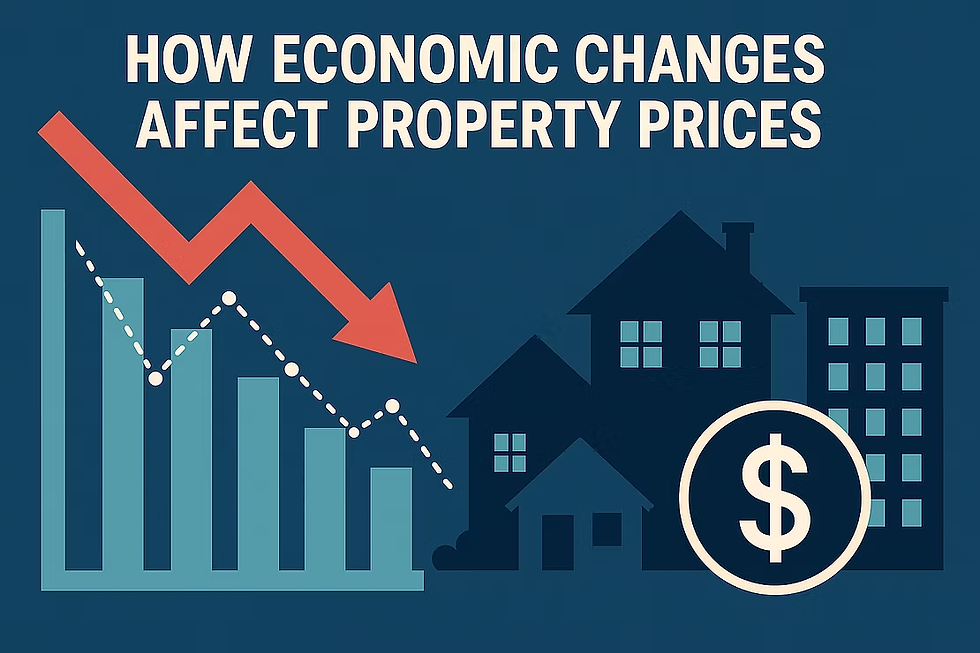Real Estate Investment
- Digital Transformation
- Sep 10, 2025
- 3 min read


In today’s fast-paced financial world, real estate investment stands out as one of the most reliable and lucrative avenues to build wealth. Whether a first-time buyer or seasoned investor, understanding the dynamics of real estate investment is essential to navigating markets effectively and making informed decisions. From tangible assets to steady income streams and inflation protection, real estate offers compelling reasons to consider it as a cornerstone of any investment portfolio. This article explores the key facets, benefits, and trends of real estate investment in 2025, painting a clear picture of why it remains a powerful wealth-building tool.
Why Real Estate Investment Matters in 2025
Real estate investment remains increasingly relevant in 2025 due to its unique blend of stability, growth potential, and income generation. Following years of economic recovery and technological advancements, real estate offers opportunities not just for capital appreciation but also for creating passive income. Additionally, shifting demographic trends and urbanization worldwide have spurred demand for housing and commercial spaces, sustaining real estate’s appeal to investors.
The global real estate market is projected to reach an astounding $654 trillion by the end of 2025, with the United States leading at $136.6 trillion in market value.
Economic stability and growth are creating increased employment and disposable incomes that fuel housing demand.
Types of Real Estate Investment
Residential Properties
Investing in single-family homes, condominiums, and apartment buildings allows investors to generate rental income, leverage property appreciation, and benefit from tax advantages. Urban centers with high migration and employment growth typically offer attractive rental yields.
Example: Cities like Lagos, Mumbai, and New York continue to experience robust rental demand, providing investors with steady returns.
Commercial Properties
Office spaces, retail centers, industrial warehouses, and mixed-use developments provide diverse investment opportunities often offering longer lease terms and potentially higher income stability.
A growing trend includes flexible working spaces and e-commerce warehouses, which have seen rental rates increase by over 6.5% annually in some markets.
Real Estate Investment Trusts (REITs)
REITs allow investors to buy shares in real estate portfolios managed by professionals without directly owning property. They offer liquidity, diversification, and dividend income.
REITs delivered an average annual return of 12.3% over the past 25 years, outperforming many traditional stocks.
In 2023, REITs distributed yields averaging 4.5%, significantly above many equity dividends.
Mixed Strategies and Passive Investment
Passive investment strategies, including crowdfunding and funds targeting real estate development or rental portfolios, enable more accessible entry points with professional management.
Passive investors benefit from steady cash flow and long-term growth without the headaches of everyday management.
Benefits of Real Estate Investment
Stable Cash Flow and Passive Income
One of the main attractions is the potential for consistent rental income generating positive cash flow after expenses. Over time, mortgage payments reduce principal, increasing equity.
Tax Advantages and Financial Leverage
Real estate investments come with multiple tax benefits including deductions for mortgage interest, depreciation, and expenses. Investors can also leverage borrowed capital to amplify returns.
Inflation Hedge and Wealth Preservation
Real estate historically acts as a hedge against inflation because property values and rental incomes tend to rise with living costs. Unlike paper assets, it’s a tangible asset providing collateral security.
Diversification and Risk Management
Adding real estate to an investment portfolio reduces volatility. According to data, real estate has a historically low correlation with stocks, helping balance risks during market downturns.
Emerging Trends Shaping Real Estate Investment in 2025
Smart and Sustainable Buildings: Growing demand for energy-efficient, tech-enabled homes supports long-term value growth.
Urbanization in Tier 2 and 3 Cities: Rapid growth beyond metros opens new markets with higher growth potential.
Increasing Role of Technology: AI, blockchain, and PropTech innovations are transforming property management and investment decision-making.
Flexible Work and Living Spaces: Changing work patterns drive demand for co-working and adaptable housing solutions.
Government Support: Housing programs and infrastructure development bolster real estate demand in various countries.
Practical Considerations for Investors
Conduct thorough market research and due diligence.
Understand financing options and risks involved.
Consider location, demand drivers, and future growth prospects.
Align investment choices with financial goals and risk tolerance.
Conclusion: Real Estate Investment is a Strategic Wealth Builder
Real estate investment offers unparalleled opportunities for building sustainable wealth through capital appreciation, rental income, and tax benefits. Its ability to hedge against inflation, diversify portfolios, and generate passive income makes it a cornerstone of smart investment strategies in 2025 and beyond.
As markets evolve with technological innovations and shifting demographics, staying informed and strategic in real estate investment decisions is more important than ever. Whether through direct ownership or REITs, stepping into real estate is stepping into an asset class fundamental to long-term financial security.
For investors seeking stability mixed with opportunity, real estate remains a compelling choice—a solid foundation for growing and preserving wealth in a complex world.



Comments